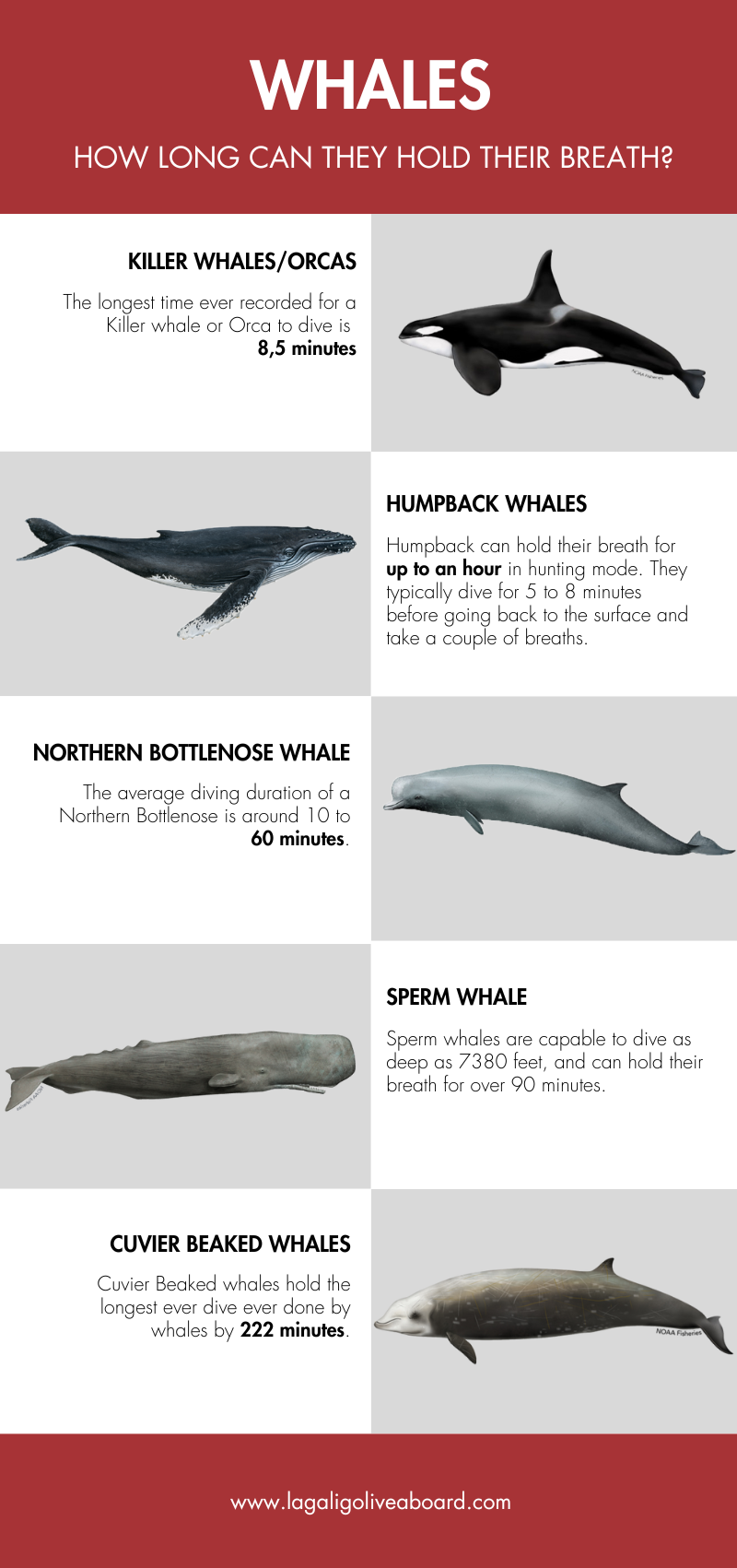Whales, the majestic giants of the ocean, can hold their breath for impressively long periods. Yet, their extraordinary diving capabilities remain a mystery to many. Understanding how long these marine mammals can stay submerged not only fascinates but also underscores the delicate balance they maintain underwater. This article dives into the science behind whale breath-holding, revealing the incredible adaptations that allow these creatures to thrive in the depths of the ocean.
You might already known that whales are not fish, they are mammals.
This means that they breath using their lungs, as they do not have gills to process oxygenated water like other marine animals.
This is the reason why when they dive, they only stay down for a while before coming back up to the surface again for another breath of air, just like you when you freedive.
The Average Diving Time of a Whale
On average, a whale can remain submerged for up to 60 minutes before needing to return to the surface for air. This impressive adaptation allows them to navigate the depths with extraordinary efficiency.
That duration is simply mind boggling when you compare it to humans. Forget about the average joe, the world record for the longest static dive (without any equipment) is 24 minutes and 37 seconds.
Note that whales are diving while moving their body a lot, which requires much more oxygen consumption.
How Whales Can Hold Their Breath For So Long
Whales also breathe using their lungs and take in oxygen from the air for use in their muscles and blood. However, they have very high concentrations of Haemoglobin and Myoglobin in their tissues and blood.
These proteins are used to store oxygen in the muscles and blood.
To put it into perspective, sperm whale has myoglobins that are roughly nine times more than those found in humans. This amazing biological adaptation aids whales in storing large amounts of oxygen within their tissues and bloodstream which enhances their ability to survive well under water.
Additionally, it is worth mentioning that whales are able to amazingly slow down their heart beats while diving deep into the sea. And even more impressively, they can actually stop the supply of blood to particular areas of their bodies, thereby switching off these body parts. This strange arrangement has helped whales to be successful in water habitats.
The Depths They Can Dive to
In diving for long durations in comparison to other whale species, the Cuvier beaked whale is unrivaled. This is because they spend most of their time far from the shore, and they dive up to depths that are beyond human reach making it difficult to study their behavior and biology.
Using satellite technology, a team of researchers tagged a bunch of Cuvier Beaked whales and tracked them. This research achieved a singular and extraordinary event since it was able to record a Cuvier beaked whale that dived at an incredible depth of 2992 meters or approximately 9816 feet.
This is the longest dive actually recorded for any type of whale.
The Record of Longest Time They Dive
The same study found that the Cuvier’s whales had spent 140 minutes or approximately 2.2 hours at the bottom before coming up for air.
Sounds mind-blowing but another study has recorded up to 222 minutes, equivalent to three hours and forty-two minutes of holding breath.
Other Whale Species

Killer Whales/ Orcas (Orcinus orca)
The “Killer whale” or the Orca is known as a top ocean predator; this, you probably know.
However, compared to a Cuvier Beaked whale, the latter’s breath-holding ability is dwarfed. Killer whales or Orcas have managed to dive for even longer period – with 8.5 minutes as the record. There is no other whale species that can go as far down as these ones and the lowest it can reach so far is 1087 meters or about 3566 feet.
Humpback Whales (Megaptera novaeangliae)
Better than the Orcas, a Humpback can hold their breath for up to an hour.
However, their average diving duration is much lower when they hunt for food.
They typically dive for 5 to 8 minutes before going back to the surface and take a couple of breaths.
Sperm Whales (Physeter macrocephalus)
Sperm whales are believed to be capable of diving as deep as 7380 feet and can hold their breath for over 90 minutes.
They usually dive that deep to find their favourite prey, squid.
Northern Bottlenose Whale (Hyperoodon ampullatus)
The average diving duration of a Northern Bottlenose is around 10 to 60 minutes.
Their ability to deep dive is somewhere above a Humpback and a Sperm whale.
With the ability to dive up to two hours, they are a close contender for longest breath hold.
Can Human Dive as Deep as the Whales?
Sadly, no.
Our body is simply not built to survive such great pressure that amounts, as we dive deep into the ocean.
The deepest dive a human ever did was 332.35 meters or 1089 feet, a world record achieved by Ahmed Gabr in the Red Sea.
But for recreational diving, the deepest we can go, assuming we have the certification level and skills required, is 40 meters.In terms of duration however, we could technically dive for a similar time length to whales.
The air tank a Scuba Diver carries with them could last somewhere around 40 to 50 minutes.
Seasoned divers, however, could make that last an hour or even more, especially at shallower depths.Make that two tanks, and you could technically last twice as long.
This could be done by taking a Sidemount scuba course.
And at this stage you are more time limited by your nitrogen consumption than the actual air mix in your tanks.Though we cannot dive as deep as the whales do, the deep ocean does not really have as much to find as the shallower coral reefs, booming with life supported by sunlight.
The deeper you go, the darker it becomes, the lesser stuff you can see, although it does become a lot weirder the rarer it gets, which is the appeal for some people.Good thing is, unlike the whales who must dive that deep in search of food, we dive to have fun and for recreation.
For some people, it is even more than that, it’s a lifestyle.
But we will always wonder about the mysteries of the deep ocean and the amazing creatures who visit these depths.

